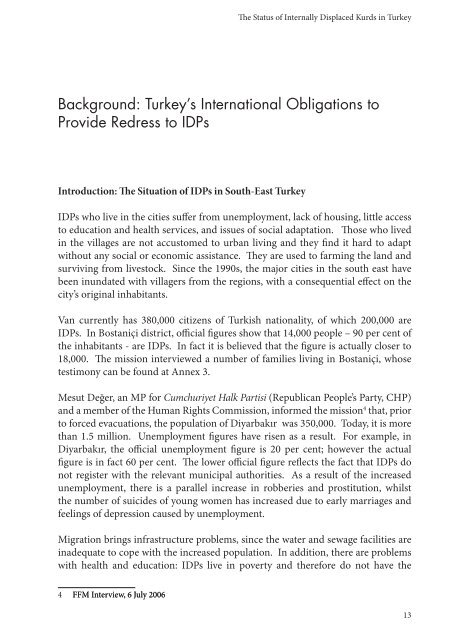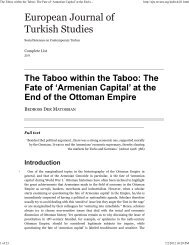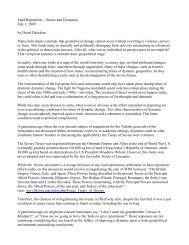The Status of Internally Displaced Kurds in Turkey: - Kurdish Human ...
The Status of Internally Displaced Kurds in Turkey: - Kurdish Human ...
The Status of Internally Displaced Kurds in Turkey: - Kurdish Human ...
You also want an ePaper? Increase the reach of your titles
YUMPU automatically turns print PDFs into web optimized ePapers that Google loves.
<strong>The</strong> <strong>Status</strong> <strong>of</strong> <strong>Internally</strong> <strong>Displaced</strong> <strong>Kurds</strong> <strong>in</strong> <strong>Turkey</strong>Background: <strong>Turkey</strong>’s International Obligations toProvide Redress to IDPsIntroduction: <strong>The</strong> Situation <strong>of</strong> IDPs <strong>in</strong> South-East <strong>Turkey</strong>IDPs who live <strong>in</strong> the cities suffer from unemployment, lack <strong>of</strong> hous<strong>in</strong>g, little accessto education and health services, and issues <strong>of</strong> social adaptation. Those who lived<strong>in</strong> the villages are not accustomed to urban liv<strong>in</strong>g and they f<strong>in</strong>d it hard to adaptwithout any social or economic assistance. <strong>The</strong>y are used to farm<strong>in</strong>g the land andsurviv<strong>in</strong>g from livestock. S<strong>in</strong>ce the 1990s, the major cities <strong>in</strong> the south east havebeen <strong>in</strong>undated with villagers from the regions, with a consequential effect on thecity’s orig<strong>in</strong>al <strong>in</strong>habitants.Van currently has 380,000 citizens <strong>of</strong> Turkish nationality, <strong>of</strong> which 200,000 areIDPs. In Bostaniçi district, <strong>of</strong>ficial figures show that 14,000 people – 90 per cent <strong>of</strong>the <strong>in</strong>habitants - are IDPs. In fact it is believed that the figure is actually closer to18,000. <strong>The</strong> mission <strong>in</strong>terviewed a number <strong>of</strong> families liv<strong>in</strong>g <strong>in</strong> Bostaniçi, whosetestimony can be found at Annex 3.Mesut Değer, an MP for Cumchuriyet Halk Partisi (Republican People’s Party, CHP)and a member <strong>of</strong> the <strong>Human</strong> Rights Commission, <strong>in</strong>formed the mission that, priorto forced evacuations, the population <strong>of</strong> Diyarbakır was 350,000. Today, it is morethan 1.5 million. Unemployment figures have risen as a result. For example, <strong>in</strong>Diyarbakır, the <strong>of</strong>ficial unemployment figure is 20 per cent; however the actualfigure is <strong>in</strong> fact 60 per cent. <strong>The</strong> lower <strong>of</strong>ficial figure reflects the fact that IDPs donot register with the relevant municipal authorities. As a result <strong>of</strong> the <strong>in</strong>creasedunemployment, there is a parallel <strong>in</strong>crease <strong>in</strong> robberies and prostitution, whilstthe number <strong>of</strong> suicides <strong>of</strong> young women has <strong>in</strong>creased due to early marriages andfeel<strong>in</strong>gs <strong>of</strong> depression caused by unemployment.Migration br<strong>in</strong>gs <strong>in</strong>frastructure problems, s<strong>in</strong>ce the water and sewage facilities are<strong>in</strong>adequate to cope with the <strong>in</strong>creased population. In addition, there are problemswith health and education: IDPs live <strong>in</strong> poverty and therefore do not have the4 FFM Interview, 6 July 200613





